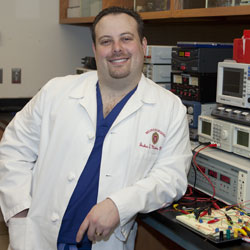
Dr. Joshua Medow. Photo courtesy of The Hartwell Foundation.
On rotation at 2 a.m. at the University of Wisconsin Hospital, Dr. Joshua Medow was a junior resident when he saw yet another child come into the emergency room after the shunt designed to remove excess fluid from his brain malfunctioned.
The parents thought the child only had a headache; instead, pressure was building inside his head. Before the night was over, the child had slipped into a coma and was rushed emergently to the operating room.
“It dawned on me, there must be a better way,” said Medow, who became an assistant professor of neurosurgery and biomedical engineering at the University of Wisconsin School of Medicine and Public Health. He also is director of neurocritical care.
With a recently announced three-year, $300,000 award from The Hartwell Foundation, Medow will be able to refine a new implantable device that will allow parents to easily monitor the pressure inside a child’s head. He hopes to begin testing the device in sheep within two years, a precursor to human clinical trials.
“It gives me the opportunity to make the world a little better than it already is,” Medow said of the funding. “It allows me to throw away the status quo and make life better and less invasive for children with shunts.”
Evidence shows half of all shunts, which also are used in adults with brain trauma, fail within two years, Medow said. Too much pressure can lead to irreparable brain damage, including blindness due to stroke and retinal damage, and the symptoms of failure are not consistent among patients.
Working with colleagues in biomedical engineering, Medow is developing an implantable device with a hand-held monitor that will allow parents to easily read what’s happening to the pressure inside their child’s head. The information will be transmitted to a physician in real-time by telephone or Internet, allowing early, accurate diagnosis of shunt failure. The implantable transmitter that monitors pressure waves uses magnetic energy, not batteries, to send information to a hand-held reader that is held over the patient’s head. With no batteries, the device would not need to be replaced every few years.
In many cases, the device will save children from unnecessary hospital admissions, procedures and surgeries to recheck the shunt. The information will let parents and physicians know if they need to take immediate action before disaster strikes, Medow said. The Implantable Intracranial Pressure Monitor is a way to standardize treatment for children and adults with shunts, Medow said.
In addition to the Hartwell Individual Biomedical Research award, Medow also recently received the 2011 Rising Star Clinical Excellence award from the University of Wisconsin Hospital and Clinics. In 2010, medical students honored him with a Medical Teaching Award.
The Hartwell Foundation, based in Memphis, Tennessee, provides funding for early stage, innovative and cutting-edge research projects before they quality for significant funding from outside sources such as the National Institutes of Health. The foundation considers several factors in choosing its Hartwell Investigators, including the transformative nature of the proposed innovation, the extent to which funding will make a difference and institutional support for the investigator.
The UW-Madison has been among the foundation’s Top Ten Centers of Biomedical Research since 2006, which allows it to nominate four individuals for the Individual Biomedical Research Award. Past recipients have included Dee-Ann Pillers, MD, PhD, a professor in the Department of Pediatrics, a 2009 investigator, and Laura Knoll, PhD, an assistant professor in the Department of Medical Microbiology and Immunology, a 2008 investigator.
